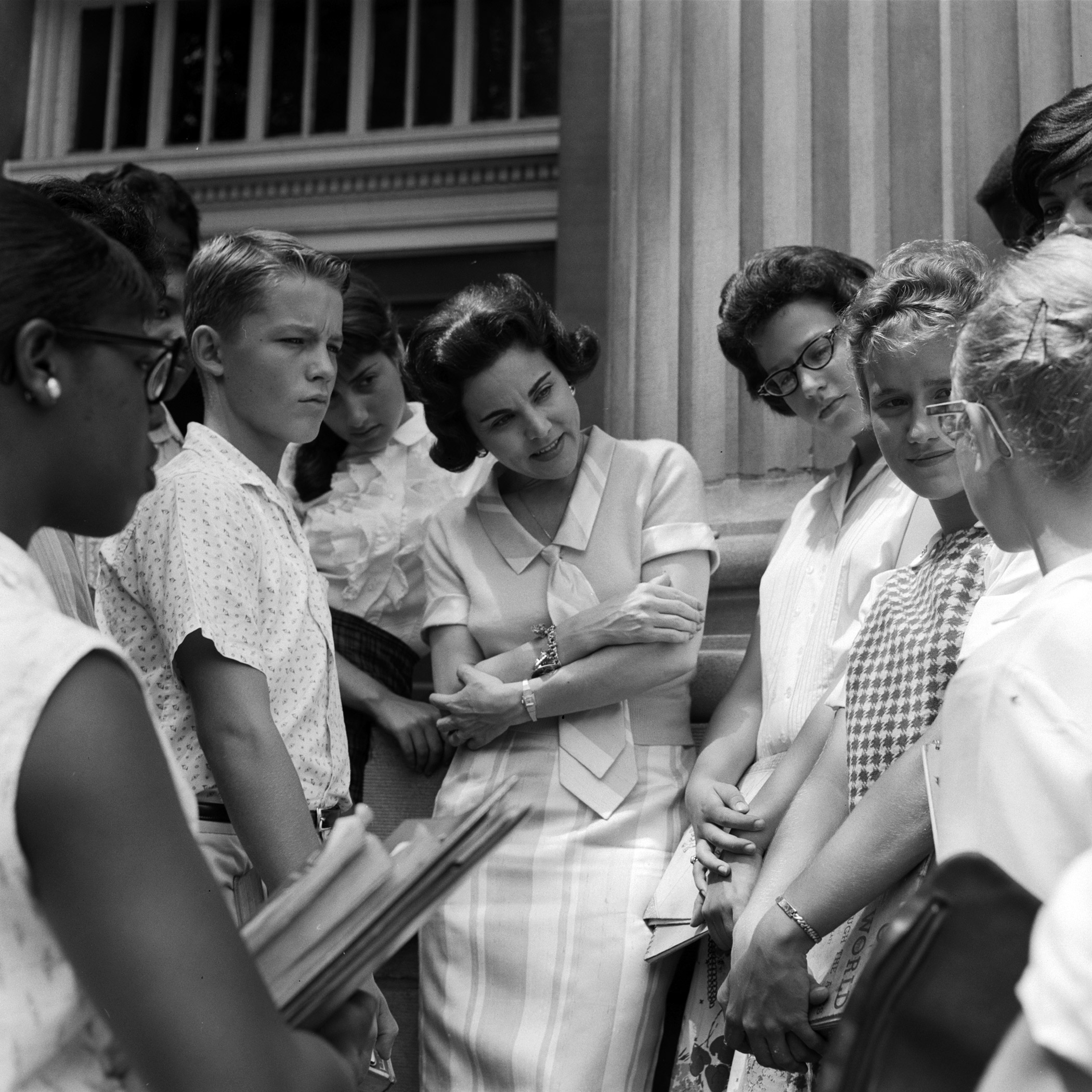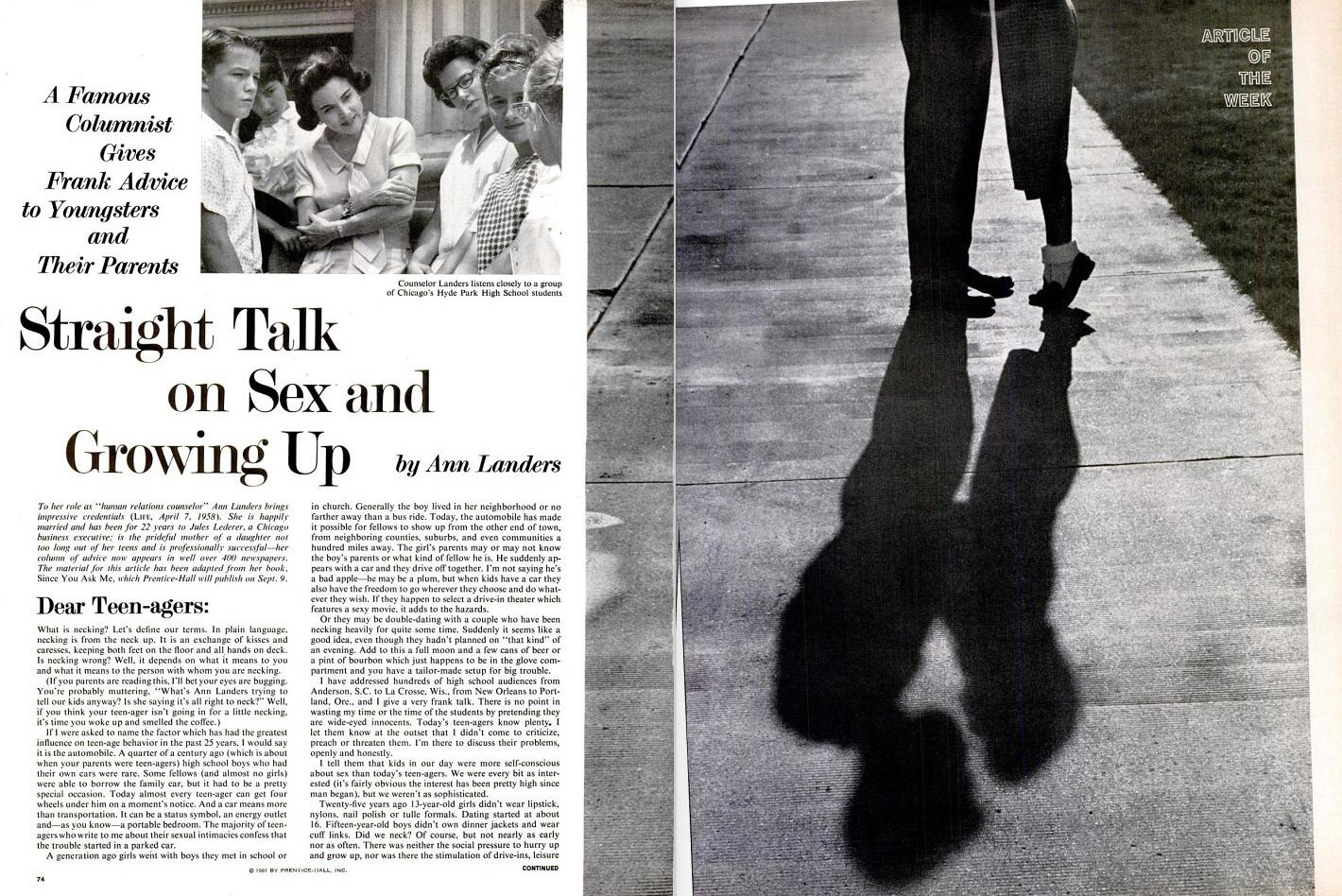
Perhaps the greatest danger of pursuing a career as an advice columnist is that your words may one day sound outmoded and prudish. When the topic on which you’re dispensing advice is sex, that risk is magnified exponentially. Case in point: Though Ann Landers (real name Eppie Lederer) would have plenty of time to update her views throughout her half-century career, her 1961 book Since You Ask Me—excerpted in LIFE magazine for the benefit of curious teens and fretful parents—took such a firm stance on teenage lust that it could read as parody today.
Landers’ attitudes toward expressions of young love—most of which fell into the categories of “necking” and “petting” (the latter of which was, in her view, a slippery slope to sex itself)—focused much attention on girls’ reputations and respectability, and might today be criticized as “slut-shaming.” That she directed her advice largely to young women (“because girls get pregnant”) reflected, and perhaps contributed to, a culture in which the responsibility for the possible outcomes of sexual activity rested largely on women.
But then again, in 1961, when Landers advised young Americans on sexual activity, the birth control pill had only recently been approved for use in the U.S., and Roe v. Wade was more than a decade away. The social consequences of teenage pregnancy—secrecy, ostracism and often an end to education—could be even more devastating for young women than they are today.
And it’s not as if debates about sex education in 2015 have been settled; though the majority of federal funding for the subject goes to comprehensive sex ed, more than $35 million went to abstinence-only programs in 2014. Some of Landers’ ideas may sound outmoded today, but at least she refused to delude herself about her audience’s appetite for information. “There is no point in wasting my time or the time of the students by pretending they are wide-eyed innocents,” she wrote. “Today’s teen-agers know plenty. I let them know at the outset that I didn’t come to criticize, preach or threaten them. I’m there to discuss their problems, openly and honestly.”
Here are the highlights of her guidance:
Rules to keep necking under control: “If you are seeing a lot of a certain someone, have a planned program of activity. Don’t just sit around with nothing special to do or, even worse, ride around with no destination. Teen-agers should bowl, swim, play tennis, golf, visit museums and art galleries, attend concerts and sports events. A sensible way to stay out of trouble is to keep active and busy. When necking becomes the major interest and No. 1 indoor sport, you’re playing with fire and you could get badly singed.”
Where to neck, if you’re going to do it: “The living room of your own home is the safest place to neck. And there must always be a light on. It goes without saying that a respectable girl never invites a boy into her house unless one or both parents are at home. If parents have good judgment, they will get lost after saying hello and visiting briefly… Thirty minutes is plenty. A 16-year-old girl should be in the house by midnight and the boy should be on his way by 12:30. Dating on school nights is absolutely out, of course.”
What can happen if “necking” leads to “petting”: “Petting can: Make you feel guilty and ashamed. Ruin your reputation. Cause you to lose your boy friend because, after he goes further than he knows he should, he may decide you’re cheap. Lead to pregnancy. Break your parents’ hearts.”
Whether “going steady” is a good idea for teens: “I’m not in favor of going steady. Young people who spend hours and hours together and go with one another exclusively become too intimate over a period of months or years. It’s inevitable. The couples who go steady rationalize their heavy necking because they ‘belong to each other.’ It’s easy to go a little further every time they neck. Kids seldom do less than they did the last time.”
The difference between boys and girls: “Most boys will go as far as they can. They’ll take anything that is offered plus whatever they can talk a girl into giving. Boys are more easily aroused than girls and their sexual demands are likely to be of a more urgent and insistent nature. A teen-age boy is concerned primarily with his biological drives and not with ‘love.’”
Why sex isn’t always right, even if it’s natural: “Of course sex is natural. So is eating. But would you sit down at the dinner table and pull the leg off a turkey or scoop up the mashed potatoes with your hands? Would you grab the fresh rolls off a bakery counter and stuff them into your mouth? Of course not, because civilized people are expected to control their natural instincts. This distinguishes men from beasts.”
How girls can avoid the temptation to have sex: “You can avoid temptation by steering clear of situations which can easily lead to unrestrained love-making. This means no parking in cars. If you want to neck, go home. With your parents in the house you aren’t likely to go farther than you should. If your parents don’t impose a curfew, impose one on yourself.”
How boys can avoid the temptation to have sex: Don’t sit around and read junk that fires your imagination and stimulates you sexually. Channel your energies into constructive outlets. Go out for football, basketball or baseball. Play tennis, golf, ping-pong, soccer or handball. Improve your swimming, wash the car, paint the garage, practice the trombone, build a boat, do your homework, mow the lawn, clean the attic.”

More Must-Reads from TIME
- Cybersecurity Experts Are Sounding the Alarm on DOGE
- Meet the 2025 Women of the Year
- The Harsh Truth About Disability Inclusion
- Why Do More Young Adults Have Cancer?
- Colman Domingo Leads With Radical Love
- How to Get Better at Doing Things Alone
- Michelle Zauner Stares Down the Darkness
Write to Eliza Berman at eliza.berman@time.com